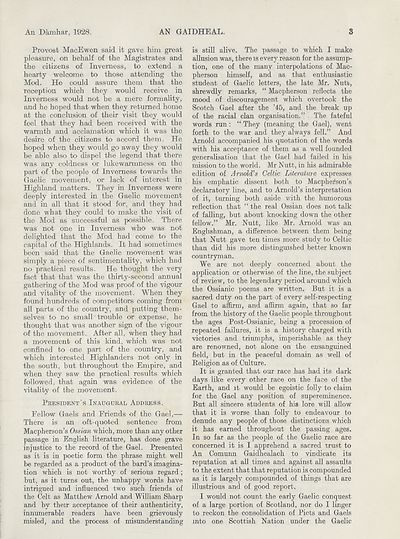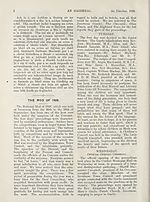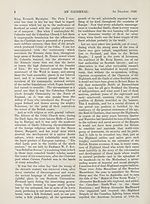Download files
Complete book:
Individual page:
Thumbnail gallery: Grid view | List view

An Damhar, 1928.
AN GAIDHEAL.
Provost MacEwen said it gave him great
pleasure, on behalf of the Magistrates and
the citizens of Inverness, to extend a
hearty welcome to those attending the
Mod. He could assure them that the
reception which they would receive in
Inverness would not be a mere formality,
and he hoped that when they returned home
at the conclusion of their visit they would
feel that they had been received with the
warmth and acclamation which it was the
desire of the citizens to accord them. He
hoped when they would go away they would
be able also to dispel the legend that there
was any coldness or lukewarmness on the
part of the people of Inverness towards the
Gaelic movement, or lack of interest in
Highland matters. They in Inverness were
deeply interested in the Gaelic movement
and in all that it stood for, and they had
done what they could to make the visit of
the Mod as successful as possible. There
was not one in Inverness who was not
delighted that the Mod had come to the
capital of the Highlands. It had sometimes
been said that the Gaelic movement was
simply a piece of sentimentality, which had
no practical results. He thought the very
fact that that was the thirty-second annual
gathering of the Mod was proof of the vigour
and vitality of the movement. When they
found hundreds of competitors coming from
all parts of the country, and putting them¬
selves to no small' trouble or expense, he
thought that was another sign of the vigour
of the movement. After all, when they had
a movement of this kind, which was not
confined to one part of the country, and
which interested Highlanders not only in
the south, but throughout the Empire, and
when they saw the practical results which
followed, that again was evidence of the
vitality of the movement.
President’s Inaugural Address.
Fellow Gaels and Friends of the Gael,—
There is an oft-quoted sentence from
Macpherson’s Ossian which, more than any other
passage in English literature, has done grave
injustice to the record of the Gael. Presented
as it is in poetic form the phrase might well
be regarded as a product of the bard’s imagina¬
tion which is not worthy of serious regard;
hut, as it turns out, the unhappy words have
intrigued and influenced two such friends of
the Celt as Matthew Arnold and William Sharp
and by their acceptance of their authenticity,
innumerable readers have been grievously
misled, and the process of misunderstanding
is still alive. The passage to which I make
allusion was, there is every reason for the assump¬
tion, one of the many interpolations of Mac-
pherson himself, and as that enthusiastic
student of Gaelic letters, the late Mr. Nutr,
shrewdly remarks, “ Macpherson reflects the
mood of discouragement which overtook the
Scotch Gael after the ’45, and the break up
of the racial clan organisation.” The fateful
words run : “ They (meaning the Gael), went
forth to the war and they always fell.” And
Arnold accompanied his quotation of the words
with his acceptance of them as a well founded
generalisation that the Gael had failed in his
mission to the world. Mr Nutt, in his admirable
edition of Arnold’s Celtic Literature expresses
his emphatic dissent both to Macphefson’s
declaratory line, and to Arnold’s interpretation
of it, turning both aside with the humorous
reflection that “ the real Ossian does not talk
of falling, but about knocking down the other
fellow.” Mr. Nutt, like Mr. Arnold was an
Englishman, a difference between them being
that Nutt gave ten times more study to Celtic
than did his more distingmshed better known
countryman.
We are not deeply concerned about the
application or otherwise of the line, the subject
of review, to the legendary period around which
the Ossianic poems are written. But it is a
sacred duty on the part of every self-respecting
Gael to affirm, and affirm again, that so far
from the history of the Gaelic people throughout
the ages Post-Ossianic, being a procession of
repeated failures, it is a history charged with
victories and triumphs, imperishable as they
are renowned, not alone on the ensanguined
field, but in the peaceful domain as well of
Religion as of Culture.
It is granted that our race has had its dark
days like every other race on the face of the
Earth, and it would be egoistic folly to claim
for the Gael any position of supereminence.
But all sincere students of his lore will allow
that it is worse than folly to endeavour to
denude any people of those distinctions which
it has earned throughout the passing ages.
In so far as the people of the Gaelic race are
concerned it is I apprehend a sacred trust to
An Comunn Gaidhealach to vindicate its
reputation at all times and against all assaults
to the extent that that reputation is compounded
as it is largely compounded of things that are
illustrious and of good report.
I would not count the early Gaelic conquest
of a large portion of Scotland, nor do I linger
to reckon the consolidation of Piets and Gaels
into one Scottish Nation under the Gaelic
AN GAIDHEAL.
Provost MacEwen said it gave him great
pleasure, on behalf of the Magistrates and
the citizens of Inverness, to extend a
hearty welcome to those attending the
Mod. He could assure them that the
reception which they would receive in
Inverness would not be a mere formality,
and he hoped that when they returned home
at the conclusion of their visit they would
feel that they had been received with the
warmth and acclamation which it was the
desire of the citizens to accord them. He
hoped when they would go away they would
be able also to dispel the legend that there
was any coldness or lukewarmness on the
part of the people of Inverness towards the
Gaelic movement, or lack of interest in
Highland matters. They in Inverness were
deeply interested in the Gaelic movement
and in all that it stood for, and they had
done what they could to make the visit of
the Mod as successful as possible. There
was not one in Inverness who was not
delighted that the Mod had come to the
capital of the Highlands. It had sometimes
been said that the Gaelic movement was
simply a piece of sentimentality, which had
no practical results. He thought the very
fact that that was the thirty-second annual
gathering of the Mod was proof of the vigour
and vitality of the movement. When they
found hundreds of competitors coming from
all parts of the country, and putting them¬
selves to no small' trouble or expense, he
thought that was another sign of the vigour
of the movement. After all, when they had
a movement of this kind, which was not
confined to one part of the country, and
which interested Highlanders not only in
the south, but throughout the Empire, and
when they saw the practical results which
followed, that again was evidence of the
vitality of the movement.
President’s Inaugural Address.
Fellow Gaels and Friends of the Gael,—
There is an oft-quoted sentence from
Macpherson’s Ossian which, more than any other
passage in English literature, has done grave
injustice to the record of the Gael. Presented
as it is in poetic form the phrase might well
be regarded as a product of the bard’s imagina¬
tion which is not worthy of serious regard;
hut, as it turns out, the unhappy words have
intrigued and influenced two such friends of
the Celt as Matthew Arnold and William Sharp
and by their acceptance of their authenticity,
innumerable readers have been grievously
misled, and the process of misunderstanding
is still alive. The passage to which I make
allusion was, there is every reason for the assump¬
tion, one of the many interpolations of Mac-
pherson himself, and as that enthusiastic
student of Gaelic letters, the late Mr. Nutr,
shrewdly remarks, “ Macpherson reflects the
mood of discouragement which overtook the
Scotch Gael after the ’45, and the break up
of the racial clan organisation.” The fateful
words run : “ They (meaning the Gael), went
forth to the war and they always fell.” And
Arnold accompanied his quotation of the words
with his acceptance of them as a well founded
generalisation that the Gael had failed in his
mission to the world. Mr Nutt, in his admirable
edition of Arnold’s Celtic Literature expresses
his emphatic dissent both to Macphefson’s
declaratory line, and to Arnold’s interpretation
of it, turning both aside with the humorous
reflection that “ the real Ossian does not talk
of falling, but about knocking down the other
fellow.” Mr. Nutt, like Mr. Arnold was an
Englishman, a difference between them being
that Nutt gave ten times more study to Celtic
than did his more distingmshed better known
countryman.
We are not deeply concerned about the
application or otherwise of the line, the subject
of review, to the legendary period around which
the Ossianic poems are written. But it is a
sacred duty on the part of every self-respecting
Gael to affirm, and affirm again, that so far
from the history of the Gaelic people throughout
the ages Post-Ossianic, being a procession of
repeated failures, it is a history charged with
victories and triumphs, imperishable as they
are renowned, not alone on the ensanguined
field, but in the peaceful domain as well of
Religion as of Culture.
It is granted that our race has had its dark
days like every other race on the face of the
Earth, and it would be egoistic folly to claim
for the Gael any position of supereminence.
But all sincere students of his lore will allow
that it is worse than folly to endeavour to
denude any people of those distinctions which
it has earned throughout the passing ages.
In so far as the people of the Gaelic race are
concerned it is I apprehend a sacred trust to
An Comunn Gaidhealach to vindicate its
reputation at all times and against all assaults
to the extent that that reputation is compounded
as it is largely compounded of things that are
illustrious and of good report.
I would not count the early Gaelic conquest
of a large portion of Scotland, nor do I linger
to reckon the consolidation of Piets and Gaels
into one Scottish Nation under the Gaelic
Set display mode to:
![]() Universal Viewer |
Universal Viewer | ![]() Mirador |
Large image | Transcription
Mirador |
Large image | Transcription
| An Comunn Gàidhealach > An Comunn Gàidhealach Publications > Gaidheal > Volume 24, October 1928--September 1929 > (11) Page 3 |
|---|
| Permanent URL | https://digital.nls.uk/125294628 |
|---|
| Description | This contains items published by An Comunn, which are not specifically Mòd-related. It includes journals, annual reports and corporate documents, policy statements, educational resources and published plays and literature. It is arranged alphabetically by title. |
|---|
| Description | A collection of over 400 items published by An Comunn Gàidhealach, the organisation which promotes Gaelic language and culture and organises the Royal National Mòd. Dating from 1891 up to the present day, the collection includes journals and newspapers, annual reports, educational materials, national Mòd programmes, published Mòd literature and music. |
|---|---|
| Additional NLS resources: |
|

